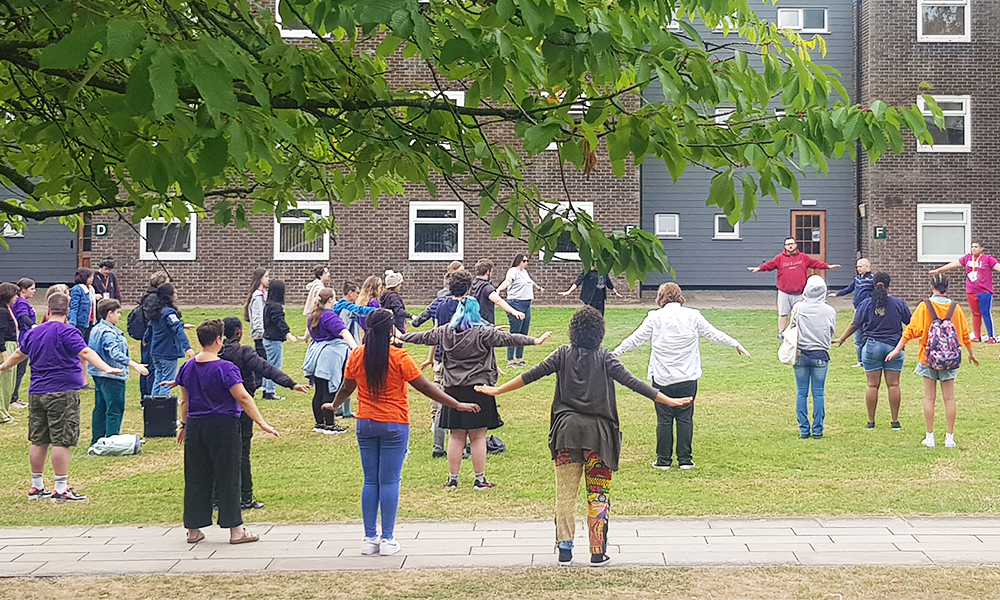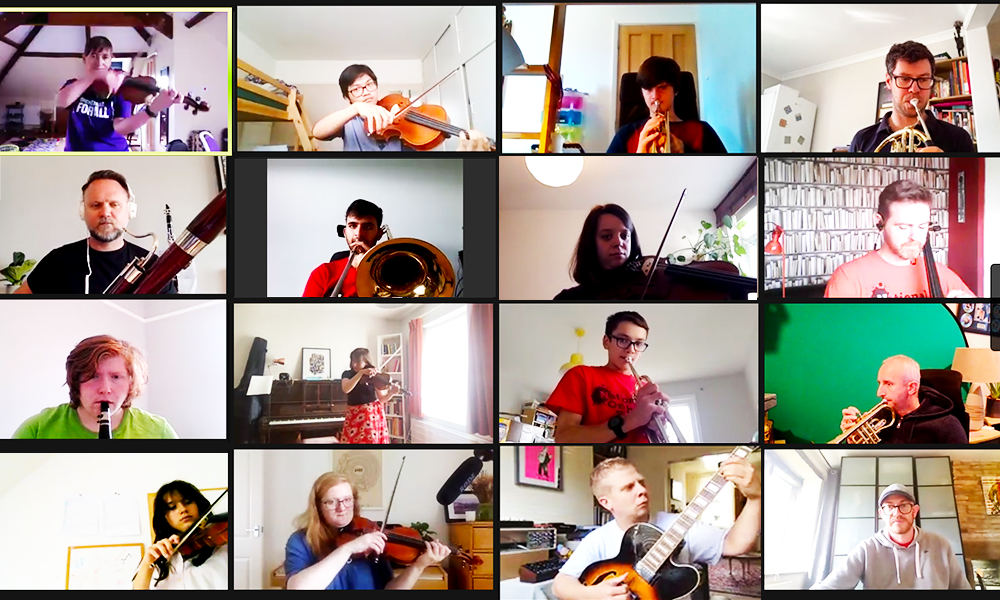Over the centuries, some of the world’s best-loved musical masterpieces have been written by women – and we’re here to celebrate them.
It’s no secret that in music, women are largely underrepresented – and it’s never been more important for us to address this issue.
According to research from Donne, which analyses composers’ works scheduled by 111 orchestras from 30 different countries, there is still much to be done.
Titled ‘Equality and Diversity in Global Repertoire’, the alarming research has shown that of the 16,327 concerts performed from 2023-2024, only 7.5% included works written by female composers – a statistic that has been steadily decreasing in recent years.
And perhaps more worryingly, only 1.6% per cent of those pieces were written by women from Global Majority backgrounds which is also lower than in previous years.
At Orchestras for All, we’re here to champion female composers every step of the way, so here are 21 women to be inspired by…
1. Dame Ethel Smyth
Ethel Smyth was a pioneering composer, conductor and suffragette, using music as a powerful tool for activism. Smyth is most well known for her opera The Wreckers, while her ‘March of the Women’ became the anthem of the suffragette movement.
She was the first woman to have an opera performed at the Metropolitan Opera in New York, breaking down barriers for women in orchestral music. Her work is bold, passionate and uncompromising – just like the composer herself!
Read more: 17 LGBTQIA+ musicians who totally rock our world >
2. Errollyn Wallen
Errollyn Wallen CBE is a Belize-born British composer whose work defies traditions. Not only is she a trailblazer in the classical world, being the first Black female composer to have her work performed at the BBC Proms (Concerto for Percussion, 1994), but she is also an accomplished singer-songwriter.
Wallen’s music spans a vast range of genres, from opera and chamber music to pop songs, blending classical traditions with influences from jazz, blues and contemporary styles. Earlier this year, Wallen also became the first Black woman to be proudly appointed as Master of the King’s Music.
3. Lucy Hale
Born in 1994, Lucy Hale inspired fans of orchestral music with her captivating compositions as well as being a role model for others living with disability. In 2019, Lucy became National Orchestra for All’s Inaugural Young Composer in Residence and worked closely with its diverse ensemble of 100 young musicians to create ‘Stories of Silk’ – specially written for NOFA’s 2019-2020 season, My Roots, Our Routes, exploring music inspired and influenced by human migrations and journeys.
After completing her studies for a Master of Music in Composition at the Royal Northern College of Music in 2017, she was appointed as inaugural Young Composer-in-Association with BSO Resound, Bournemouth Symphony Orchestra’s disabled-led ensemble. Alongside ‘Stories of Silk’, Lucy’s striking compositions include ‘Zeta’, ‘To Run With The Tigers’ and dramatic orchestral masterpiece, ‘Against the Tide’.
4. Dobrinka Tabakova
Born in Bulgaria and raised in London, Dobrinka Tabakova draws inspiration from medieval chant, minimalism and Eastern European folk traditions. Her music is filled with rich harmonies and luminous textures, creating deeply expressive soundscapes.
Her Concerto for Cello and Strings showcases her ability to blend tradition with fresh, modern sounds. As a composer-in-residence at the BBC Concert Orchestra, she continues to push orchestral music in new and exciting directions.
5. Florence Price
Florence Price made history as the first African American woman to have her work performed by a major U.S. orchestra. Premiering in 1933, her Symphony No. 1 in E minor blends African American spirituals, Western classical forms and vibrant rhythms.
Last season, the young people in National Orchestra for All and our Modulo ensembles performed the spectacular ‘Allegro ma non troppo’ (first) movement from this symphony at arts venues nationwide, embracing Price’s groundbreaking legacy and keeping the work relevant today.
6. Mélanie Bonis
As a woman in 19th-century France, Mélanie Bonis faced significant barriers to become a composer. Despite her musical abilities and studying at the Paris Conservatoire, her parents opposed her ambitions, believing it was not a suitable profession for a woman.
Incredibly, she went on to compose over 300 pieces of music, including orchestral, choral and chamber music that bridges the Romantic and Impressionist styles. Her Femmes de Légende piano suite, inspired by legendary women from throughout history, mythology and literature, highlights her powerful storytelling and unwavering beliefs. Today, her music is finally gaining the recognition it deserves.
7. Samantha Fernando
The music of Surrey-based composer, Samantha Fernando, stands out owing to its harmonic colour and resonance, which often gives her work a meditative quality – with Sense of Place (2014) and The Journey Between Us (2016) being two of her most popular works.
Samantha’s career as a composer has gone from strength to strength in recent years, having been commissioned by numerous ensembles and festivals – including the London Sinfonietta, Aldeburgh Music, the Oxford Lieder Festival and the Philharmonia Orchestra. Currently, the multi-award-winner is an Honorary Research Fellow in composition at Royal Holloway, University of London and in 2020, she took to Twitter for a live Q&A to share her musical expertise with the 100 young musicians of National Orchestra for All.
8. Fanny Hensel
Fanny Hensel, more commonly known by her family name, Fanny Mendelssohn, was a visionary composer and pianist, who fought against societal restrictions to compose over 400 works that showcase her bold, romantic spirit and lyrical melodies.
Hensel played a crucial role in Berlin’s musical scene, proving her unstoppable passion for composition and performance. Her composition Das Jahr, a twelve-piece piano cycle inspired by the months of the year, highlights her emotional depth and innovative style.
Read more: 7 ways to support musicians in the LGBTQIA+ community >
9. Nadia Boulanger
Nadia Boulanger wasn’t just a composer, she was a force in 20th-century music. As a conductor, educator and mentor to legends like Philip Glass, Aaron Copland and Quincy Jones, she has shaped the future of orchestral music.
Her own compositions, such as Three Pieces for Cello and Piano, reveal her deep understanding of form and emotion. Boulanger shattered barriers by becoming the first woman to conduct major orchestras, proving that leadership in music knows no gender.
10. Rebecca Clarke
A groundbreaking violist and composer, Rebecca Clarke redefined chamber music. Her Viola Sonata is hailed as one of the greatest viola compositions ever written, blending Impressionist colours with passionate Romanticism.
Aged 16, she auditioned for the Royal Academy of Music, gaining a place as a violin student. However, after just two years, her father made her leave when her harmony teacher proposed to her. She later attended the Royal College of Music, where she was the first woman to be taught composition by Charles Stanford. Although much of her work remained unpublished for years, Clarke’s compositions are now celebrated for their intensity, lyricism and daring harmonic choices.
11. Clara Schumann
Clara Schumann was not only a celebrated pianist but also a brilliant composer who shaped Romantic music. She composed her famous Piano Concerto in A minor at only 14 years old. She was also a dedicated mentor to Johannes Brahms and a champion of contemporary music in the mid 1800s, along with being one of the first musicians to perform from memory, revolutionising piano recitals.
Most of Schumann's music was never played by anyone other than herself, and was largely forgotten until the 1970s. Today her compositions are increasingly performed and recorded, gaining her the recognition she deserves.
12. Francesca Caccini
Francesca Caccini was a groundbreaking composer, singer and teacher who became the first woman to write an opera: La liberazione di Ruggiero (1625).
Whilst working in the Medici court – the home of one of the most influential musical, political and powerful families in Florence, she composed intricate madrigals (non-religious songs popular in the Renaissance and Baroque periods) and songs that displayed her love for drama, counterpoint and lyrical expression. Her work helped to lay the foundations of early opera and paved the way for women in a male dominated musical world.
13. Amy Beach
A self-taught composer and virtuoso pianist, Amy Beach broke down barriers by becoming the first American woman to compose a symphony, titled Gaelic Symphony. Her music is known for its sweet, Romantic-style orchestration and stunning lyricism.
She composed over 150 numbered works, nearly all of which were published, including choral works, church music, chamber works, cantatas and songs to words of Shakespeare, Robert Burns and Robert Browning. She was a true trailblazer, who championed women’s roles in composition and performance.
14. Joan Tower
Joan Tower is one of the most influential living American composers. She is most well known for her Fanfare for the Uncommon Woman, which is a powerful response to Aaron Copland’s Fanfare for the Common Man, celebrating women’s contributions to music and society. In 1990, she became the first woman to win the prestigious Grawemeyer Award for ‘Silver Ladders’, a piece she wrote for the St. Louis Symphony Orchestra, where she was Composer-in-Residence from 1985-1988.
During a career spanning more than 60 years, she has made lasting contributions to music in the United States and beyond as a composer, performer, conductor and educator. Her works have been commissioned by countless major ensembles, soloists and orchestras and are regularly performed worldwide.
15. Hildur Guðnadóttir
Born in 1982, Hildur Guðnadóttir is an Icelandic composer and cellist whose haunting, immersive soundscapes have transformed film and television scores. She made history as the first woman to win an Oscar for Best Original Score for Joker (2019).
Guðnadóttir has continued to be celebrated, winning a BAFTA, Golden Globe and two Grammy’s in her ncredible career so far. Her innovative use of electronics and live recordings has redefined the boundaries of composition for cinema and inspires composers across the world.
16. Margaret Bonds
Margaret Bonds was a composer and pianist whose music was deeply rooted in African American spirituals and activism. Bonds was the first African American woman to perform with the Chicago Symphony Orchestra, and was the featured pianist for the Woman’s Symphony Orchestra of Chicago’s performance of Florence Price’s Piano Concerto in D Minor. She also collaborated with poet, Langston Hughes, and wrote powerful choral and orchestral works, advocating for social justice through music.
This year, her composition ‘The Montgomery Variations’ has been featured as one of the BBC’s Ten Pieces. Written in response to the Montgomery Bus Boycott, a huge protest brought about by the brave actions of Rosa Parks, the piece is an incredible example of Bonds dedication to social activism and support of Black women at a time of segregation.
17. Louise Farrenc
Louise Farrenc was a pioneering composer, pianist and professor, now celebrated for her powerful symphonies and chamber music. As one of the few female professors at the Paris Conservatoire, she fought for and won equal pay, paving the way for future generations.
Her acclaimed Symphony No. 3 is a stunning example of 19th-century orchestral writing. She never received the popular recognition she deserved during her lifetime, but kept writing her music and fighting for gender equality.
18. Judith Weir
Judith Weir is a composer of lyrical, folk-inspired music. Originally an oboist, she was a member of The National Youth Orchestra of Great Britain and went on to study composition at both Cambridge University and the Boston University Tanglewood Institute.
Weir was the first woman to hold the title of Master of the King’s Music in the UK. Her operas, such as Blond Eckbert and Miss Fortune, blend contemporary themes with traditional storytelling, showcasing her unique voice in modern orchestral music.
19. Hildegard of Bingen
Born in 1068, Hildegard of Bingen was a medieval nun who went on to become not just a composer but a poet, theologian and visionary, and is one of the first known female composers. She lived until 81 years of age – an incredible feat in the eleventh century – and her music (known as ‘chants’) was truly ethereal and intensely spiritual. Hildegard even believed these chants were given to her in a series of visions.
Her sacred music remains as some of the most celebrated early music compositions, influencing generations of composers and musicians throughout history.
20. Yoko Shimomura
Yoko Shimomura is one of the most acclaimed female video game composers in history, known for her emotive, orchestral scores for Kingdom Hearts, Street Fighter II, and Final Fantasy XV. Born in the Hyōgo prefecture of Japan in 1967, Shimomura has had a passion for music and video games since she was a child, and been an active composer for video games for over 30 years.
Her work brings symphonic grandeur to gaming, proving that video game music belongs in the concert hall, and continues to play a crucial role in the lives of composers and gamers alike.
21. Cassie Kinoshi
Cassie Kinoshi is a Mercury Prize-nominated and Ivors Academy Award-winning composer, arranger and alto-saxophonist, blending jazz, classical and African rhythms. As the leader of SEED Ensemble, she challenges conventions and creates music that celebrates identity, culture and storytelling.
Kinoshi’s ‘the colour of all things constant’ is a beautiful new piece written for the BBC Ten Pieces, and co-commissioned by the BBC together with the ABRSM, Music for Youth and Royal Albert Hall. It was first played by the BBC Philharmonic Orchestra and included a powerful 40-strong choir of 16-18-year-olds.
At Orchestras for All, we believe that every voice deserves to be heard – and these composers remind us why representation matters. These extraordinary composers have shaped music in ways that continue to inspire generations. By celebrating their achievements and performing their works, we can ensure that their legacies continue to thrive and inspire future musicians.
Keen to support diversity in music? Please donate what you can to our inclusive programmes:














